#i saw ramallah
Explore tagged Tumblr posts
Text

I Saw Ramallah - Mourid Barghouti
8 notes
·
View notes
Text
“I do not live in a place. I live in a time.” I Saw Ramallah by Mourid Barghouti
When his name is finally called after waiting for hours, he grabs his small bag and steps on to the Allenby Bridge to cross, for “the first time in thirty summers,” from Jordan to the West Bank: Is this a political moment? Or an emotional one? Or social? A practical moment? A surreal one? A moment of the body? Or of the mind? The wood creaks. What has passed of life is shrouded in a mist that…

View On WordPress
#Ahdaf Soueif#Arabic#book review#books#I Saw Ramallah#literature#memoir#Mourid Barghouti#Palestine#Palestinian#translation
0 notes
Text
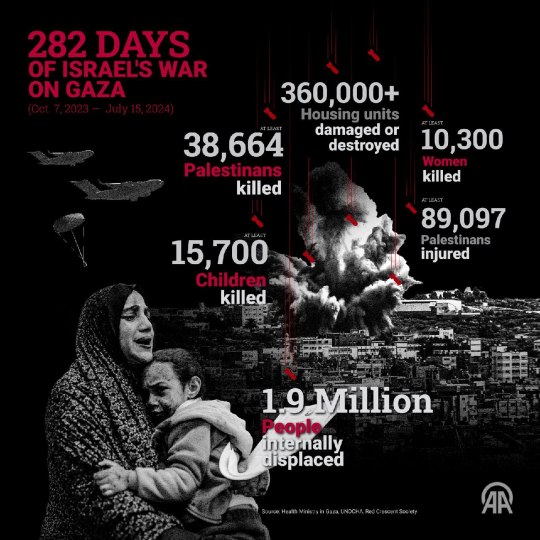
[ 📹 Dead and wounded arrive at a hospital in Gaza after the Israeli occupation forces bombed a residential building in the Al-Maghazi Camp, in the central Gaza Strip on Monday. 📈 The current death toll in the Israeli genocide now exceeds 38'664 Palestinians killed, while another 89'097 others have been wounded since Oct. 7th. ]
🇮🇱⚔️🇵🇸 🚀🏘️💥🚑 🚨
283 DAYS OF GENOCIDE IN THE GAZA STRIP: GAZANS IN ISRAELI DETENTION FACE TORTURE, RAPE AND DEATH, SMOTRICH REJECTS THE POSSIBLE RELEASE OF PALESTINIAN PRISONERS IN EXCHANGE DEAL, 15 YEARS NEEDED TO REMOVE THE RUBBLE OF GAZA, ISRAELI MASSACRES CONTINUE AS GENOCIDE ENTERS ITS 40TH WEEK
On 283rd day of the Israeli occupation's ongoing special genocide operation in the Gaza Strip, the Israeli occupation forces (IOF) committed a total of 3 new massacres of Palestinian families, resulting in the deaths of no less than 80 Palestinian civilians, mostly women and children, while another 216 others were wounded over the previous 24-hours.
It should be noted that as a result of the constant Israeli bombardment of Gaza's healthcare system, infrastructure, residential and commercial buildings, local paramedic and civil defense crews are unable to recover countless hundreds, even thousands of victims who remain trapped under the rubble, or whose bodies remain strewn across the streets of Gaza.
This leaves the official death toll vastly undercounted as Gaza's healthcare officials are unable to accurately tally those killed and maimed in this genocide, which must be kept in mind when considering the scale of the mass murder.
Details have emerged about the severe abuse of Palestinian detainees while being held in Israeli prisons. This comes after journalist Mohammad Arab met with his lawyer who visited the Ofer Prison near Ramallah in the occupied West Bank on Sunday.
According to Khaled Mahajna, a lawyer with the Commission of Detainees' Affairs, who spoke at a press conference after he visited two clients from the Ofer Prison, detailed his clients' experiences under interrogation at the Sde Teiman Camp, a prison in the Negev desert of southern occupied Palestine.
Speaking of his visit to Ofer Prison, Mahajna says his client was questioned about a prior visit from his lawyer and threatened with punishment for disclosing his experiences.
Mahajna said Arab described witnessing the rape of Gazan detainees, telling his lawyer one was stripped naked during an assault, while another detainee was also stripped naked and electricuted, before being sexually assaulted.
Mahajna told reporters that Palestinian detainees were forced to lie on the ground with their hands bound behind their heads before police dogs were released, attacking the bound men.
Mahajna went on to add that more than 100 detainees were blindfolded before being transferred from the Sde Teiman Camp to the Ofer Prison, leading the prisoners to believe they were being taken to a camp near Gaza.
According to the Israeli Prison Services, more than 9'000 Palestinian detainees are currently being held in Israeli prisons.
In other news, Israeli Finance Minister Bezalel Smotrich said on Monday, July 15th, that he opposes the release of Palestinian prisoners as part of a hostage exchange and ceasefire agreement with the Palestinian resistance factions.
Smotrich described the release of Palestinian prisoners as a "terrible and horrific event," going on to say that "I will not agree to it; a red line must be drawn."
“We saw what happened in the deal for Gilad Shalit (former Israeli soldier who was released by the Resistance in a 2011 hostage deal). We released Yahya Sinwar, and we see what we got in return,” Smotrich said, before asking “With what logic will we release the next Yahya Sinwar and endanger thousands more Israelis?”
In the 2011 hostage exchange, the Hamas Palestinian resistance movement released the soldier Shalit in exchange for the release of some 1'027 Palestinian prisoners, including the current Al-Qassam military leader, Yahya Sinwar, who remains at large and hunted by occupation forces.
Smotrich concluded his statement by saying that “I will oppose this, even if it ends my political career.”
“If there are no red lines, you have no right to practice politics,” he said.
In more news on Monday, the United Nations has estimated that it would take a fleet of 100 trucks more than 15 years to remove the mountain of rubble burying the Gaza Strip, while the removal is estimated to cost approximately US$600 million.
The UN also estimates that 137'297 buildings have been damaged or destroyed since the start of the Israeli occupation's genocidal war, equivalent to more than half of the enclave's buildings.
The UN says that, of the targeted buildings, around a quarter are completely destroyed, while a tenth are severely damaged.
In total, the UN stated that rubble covers as much as five square kilometers of Gaza, with the UN proposing that most of the rubble is not recoverable or recyclable, and will have to be disposed of.
Previously, the United Nations estimated that rebuilding the Gaza Strip, with all its destroyed homes and facilities, wouldn't be completed until at least 2040, and is expected to cost in excess of US$40 Billion, which the UN described as an "optimistic estimate".
The UN also pointed to the destruction of Gaza's schools, sewage and water lines, medical and other vital infrastructure, stating that the quality of healthcare, education and social services in Gaza has returned to levels unseen since 1980.
According to the United Nations, more than 44 years of development in Gaza has been completely erased.
“The damage to infrastructure is unbelievable, there is not a single building in Khan Younis that has not been damaged,” a UN official told the media
“The terrain has changed, new hills have appeared. The bombs dropped have changed the landscape."
It was also noted that piles of rubble across the Gaza Strip are filled with unexploded bombs and other explosive materials, which will make the reconstruction of the Gaza Strip an even more difficult task, the UN official concluded.
Meanwhile, the Israeli occupation's genocidal war goes on, with occupation bombing and shelling continuing to target civilian homes, infrastructure and other facilities.
On Sunday, occupation warplanes bombed the UNRWA-run Abu Oreiban School, which housed displaced Palestinian families in the Nuseirat Camp, in the central Gaza Strip, resulting in the deaths of 15 Palestinian civilians, mostly women and children, and wounding another 70 others.
The Zionist entity's atrocities continued when an Israeli drone targeted citizens in the Bir Abu Salah area in the town of Al-Zawaida, in the central Gaza Strip, resulting in the death of one Palestinian and injuring several others.
In another attack, the Israeli occupation forces bombed the Al-Mashrou area, east of the city of Rafah, in the southern Gaza Strip, killing a Palestinian and wounding others, while at the same time, occupation fighter jets bombed civilian homes north of the New Camp area of the Nuseirat Camp, killing and wounding several citizens.
Zionist warplanes went on to bomb a residential home in Bani Suhaila, east of Khan Yunis, in the south of Gaza, and also targeting a civilian residence northeast of the Nuseirat Camp, while an occupation drone fired live bullets towards residents of the Al-Zaytoun neighborhood, southeast of Gaza City.
By dawn on Monday morning, the Israeli occupation army had fired several artillery shells towards the neighborhoods of Tal al-Hawa, Sheikh Ajlin, and al-Sabra in Gaza City, while Zionist helicopters fired rockets and bullets at civilians in the Tal al-Hawa neighborhood, southwest of the city.
Similarly, occupation artillery detatchments shelled in the vicinity of Street 8 in the Al-Zaytoun neighborhood, southeast of Gaza City.
The occupation's bombing also targeted a residential home belonging to the Al-Manaama family in the Al-Maghazi Camp, in the central Gaza Strip, after which, civil defense and rescue crews managed to recover the bodies of 5 martyrs, including 3 children.
Occupation artillery shelling and aircraft bombing also targeted the Al-Mughraqa area, along with the northern outskirts of the Nuseirat Camp, both in central Gaza, as well as in the Bureij Camp, while occupation forces also opened fire from helicopters northwest of Al-Zahra'a.
An occupation warplane also fired a missile into a residential apartment near the Al-Awda School in the town of Abasan Al-Kabira, east of Khan Yunis, with no injuries reported in the strike.
Israeli artillery shelling went on to target the western neighborhoods of Rafah City, south of Gaza, coinciding with gunfire from Zionist helicopters in the same area.
In another bombing, occupation fighter jets bombed a gathering of civilians on Al-Mansoura Street in the Al-Shujaiya neighborhood, east of Gaza City, killing 3 civilians and wounding several others.
Israeli war crimes continued into Monday evening, when occupation warplanes bombed a house in the Nuseirat Camp, resulting in the martyredom of 6 Palestinians and wounding a number of others.
As a result of the Israeli occupation's ongoing war of extermination in the Gaza Strip, the endlessly rising death toll now exceeds 38'664 Palestinians killed, including at least 10'000 women and well over 15'000 children, while another 89'097 others have been wounded since the start of the current round of Zionist aggression, beginning with the events of October 7th, 2023.
This brings the total number of casualties in the genocide to 127'761 or 5.55% of the 2.3 million Palestinian residents of the Gaza Strip.
July 15th, 2024.
#source1
#source2
#source3
#source4
#source5
#source6
#source7
#source8
#source9
#videosource
#graphicsource
@WorkerSolidarityNews
#gaza#gaza strip#gaza news#gaza war#gaza genocide#war in gaza#genocide#genocide in gaza#israeli war crimes#israeli genocide#war crimes#crimes against humanity#israeli occupation#israel#palestine#palestine news#palestinians#free palestine#gaza conflict#israel palestine conflict#politics#news#geopolitics#international news#global news#world news#war#breaking news#current events#middle east
2K notes
·
View notes
Text
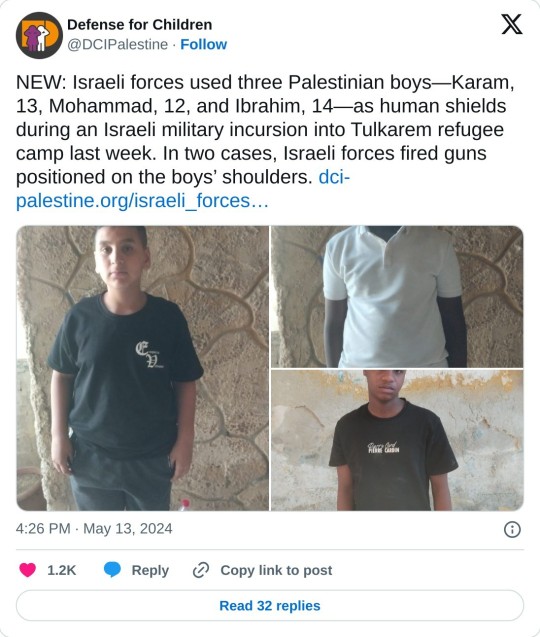
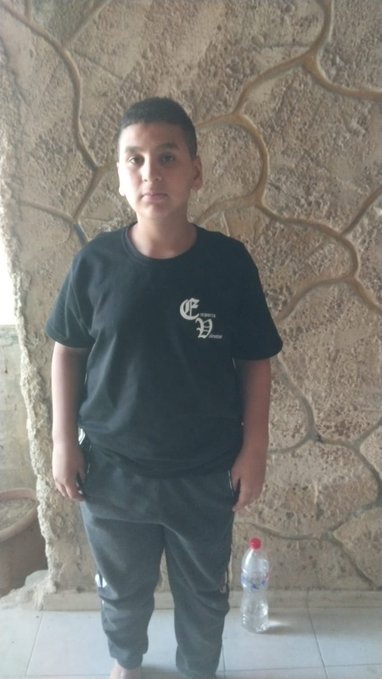
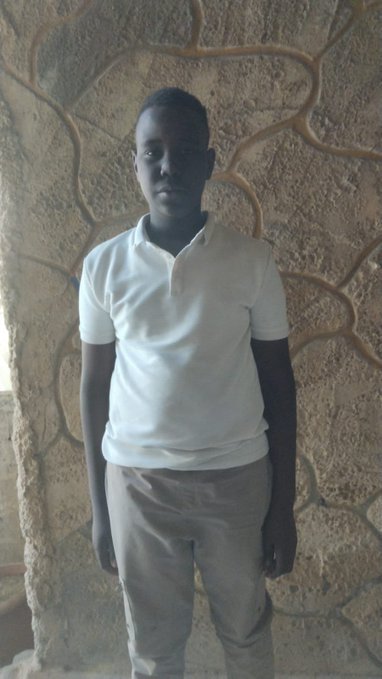
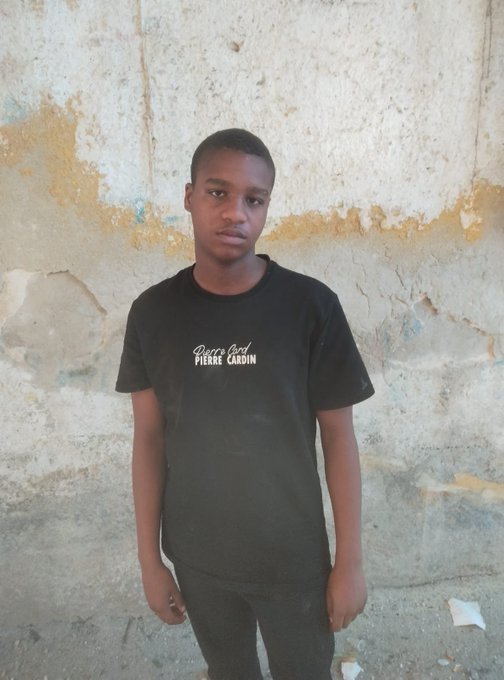
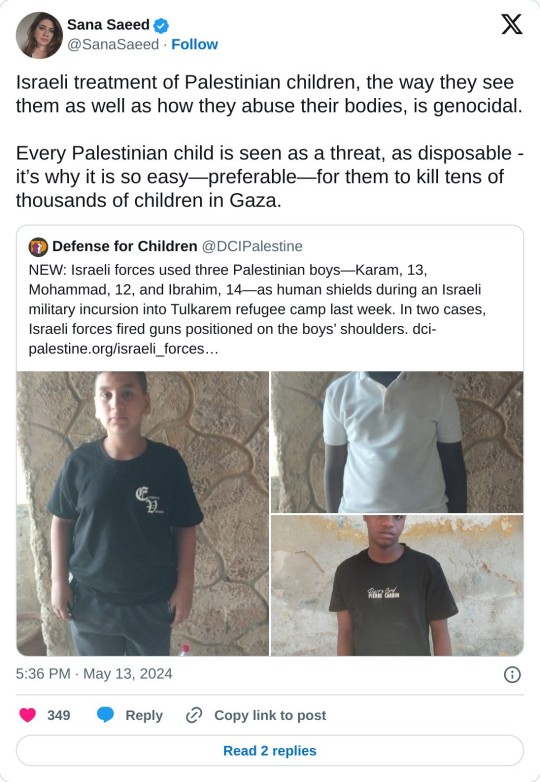
Ramallah, May 13, 2024—Israeli forces used three Palestinian boys as human shields in the northern occupied West Bank last week.Karam, 13, Mohammad, 12, and Ibrahim, 14, were used as human shields by Israeli forces in separate incidents during an Israeli military incursion into Tulkarem refugee camp on May 6, according to documentation collected by Defense for Children International - Palestine. In all three incidents, armed Israeli soldiers forced the boys to walk in front of them as soldiers searched Palestinian homes and neighborhoods in Tulkarem refugee camp, and in two cases, Israeli forces fired weapons positioned on the boys’ shoulders. “International law is explicit and absolutely prohibits the use of children as human shields by armed forces or armed groups," said Ayed Abu Eqtaish, accountability program director at DCIP. “Israeli forces intentionally putting a child in grave danger in order to shield themselves constitutes a war crime.” Around 30 Israeli soldiers entered 13-year-old Karam’s home on the morning of May 6, located on the third floor of an apartment building. Israeli forces isolated Karam’s family in one room and forced Karam to walk in front of them, open the doors to each room, and enter it before them. Then, Israeli forces moved Karam and his family to the fourth floor of the building, where the rest of the building’s residents were held.Israeli forces then took Karam to the building’s staircase, where they were accompanied by a “huge military dog,” as Karam told DCIP. While they were walking, one soldier placed his rifle on Karam’s right shoulder and fired two shots toward an apartment in the building. "I was crying and shaking in fear, and whenever I begged the soldiers to stop, they would scream at me and order me to be silent," Karam said."After the soldiers searched the apartments of the building that I was entering before them, I asked them while crying where they were taking me. One of them answered me in Arabic that they would take me with them to show them the way, in addition to opening the doors of the neighboring houses and entering before they did." When Karam and the Israeli soldiers arrived at the first floor of the building, where his grandmother lives, she began yelling at them and asking them to release him, so they returned him to the fourth floor. Karam’s grandmother was unable to climb the stairs to the fourth floor due to her age and health and Israeli forces permitted her to stay on the first floor. "While we were climbing up the stairs, three soldiers assaulted me severely with black sticks that they had. They beat me on my lower limbs and my back for about five minutes, while they were telling me that I was a terrorist. When I reached the fourth floor, I was exhausted and could not stand as a result of the beating and fear. I was kept with the residents of the building until around 7 p.m., during which the soldiers did not allow us to eat anything," Karam told DCIP.
12-year-old Mohammad told DCIP that his family decided to go to their relatives' house in Tulkarem refugee camp after they heard that Israeli forces had besieged the camp so they would not be alone. Their relatives' house was an apartment located on the second story of a residential building. Around 8 a.m. on May 6, Israeli soldiers entered the apartment and ordered everyone to leave, and when they saw Mohammad, they took him away from his family, despite his mother's pleas and desperate attempts to free him. "I was left alone with the soldiers after they ordered my mother and siblings to go up to the fourth floor of the building. I started crying and shaking in fear because I did not know what they would do to me. They were armed, masked, and had frightening appearances. They had a huge military dog that made terrifying sounds," Mohammad told DCIP. "After that, the soldiers told me to knock on the doors of the apartments in the building, while they were standing behind me at a fairly short distance, and to ask the residents to come out, and this is what I did. When we reached the door of one of the apartments, there was no one inside, so the soldiers blew up the door and forced me to go inside alone and check and search it. After I told them that it was empty, they entered it, while I remained held by one of the soldiers at the door," Mohammad added. "While I was held in the hallway, the soldier guarding me assaulted me with a wooden stick for about 10 minutes. He hit me on my head and back. After the soldiers left the apartment, they took me to the fourth floor, during which one of them hit me with his hands on my head, and I fell on my face. One soldier also put his rifle on my shoulder and fired several bullets at the ceiling of the staircase. They kept me with them for about two hours, during which I was crying out of fear, terror, and pain. I begged them a lot to no avail. When we reached the fourth floor, I was searched before I was held with the rest of the building's residents until about 7 p.m., without being allowed to have anything to eat,” Mohammad said.
14-year-old Ibrahim was in his family’s home in Tulkarem refugee camp around 9:30 a.m. on May 6 when Israeli soldiers entered and searched their house. “A number of soldiers took me to one of the rooms and began interrogating me about the whereabouts of wanted men. When I told them that I did not know anything, one of them threatened me in Arabic and said that he would shoot me if I did talk, after which he slapped me and kicked me for a few minutes. Then, my hands were cuffed behind my back with a plastic tie, and I was taken outside and forced to walk in front of the soldiers,” Ibrahim told DCIP. “I was trembling because of intense fear and terror,” Ibrahim said. “At first, I thought they wanted to arrest me, but they told me to walk in front of them in the alleys of the Sawalma neighborhood in the camp. They would hide in the alleys and tell me to see if there was anyone around. After that, they untied my hands, and whenever we passed a house or building, they would instruct me to enter and ask the residents to come out. Then they would raid those houses and tell me to open the doors into different rooms.” After about two hours, Ibrahim was taken to one of the houses in the camp and held there with the residents until Israeli forces withdrew from Tulkarem refugee camp.
Since 2000, DCIP has documented 34 cases involving Palestinian children being used as human shields by the Israeli army. Last year, Israeli forces used four young children in Aqbat Jabr refugee camp, near Jericho in the occupied West Bank, as human shields.
#yemen#jerusalem#tel aviv#current events#palestine#free palestine#gaza#free gaza#news on gaza#palestine news#news update#war news#war on gaza#children of palestine#tulkarem#tulkarm#palestine genocide#war crimes#long post#child abuse
1K notes
·
View notes
Text








🍉 Books for Read Palestine Week 2024 [ Nov 29 - Dec 5 ]
✨ This guide will no doubt get hidden, given the topic, so please help me by sharing this!
❓What are you reading this week?
🍉 Educate and empathize! Here are 82 books you can read for Read Palestine Week! I've included 26 queer books for those of you who #readqueerallyear as well. Please read these books to learn more about the Palestinian experience. Shukran (thank you)!
✨ Poetry 🍉 Enemy of the Sun - (ed) Edmund Ghareeb and Naseer Aruri 🍉 A Mountainous Journey - Fadwa Tuqan 🍉 So What - Taha Muhammad Ali 🍉 Affiliation - Mira Mattar 🍉 The Butterfly's Burden - Mahmoud Darwish 🍉 Born Palestinian, Born Black & The Gaza Suite - Suheir Hammad 🍉 Breaking Poems - Suheir Hammad 🍉 In the Presence of Absence - Mahmoud Darwish 🍉 Rifqa - Mohammed el-Kurd 🍉 My Voice Sought the Wind - Susan Abulhawa 🍉 Blood Orange - Yaffa 🏳️🌈 🍉 To All the Yellow Flowers - Raya Tuffaha 🏳️🌈 🍉 Before the Next Bomb Drops - Remi Kanazi 🍉 Birthright - George Abraham 🏳️🌈 🍉 Tent Generations - Various 🍉 Who is Owed Springtime - Rasha Abdulhadi 🏳️🌈 🍉 The Twenty-Ninth Year - Hala Alyan 🏳️🌈 🍉 Some Things Never Leave You - Zeina Azzam 🍉 I Saw Ramallah - Mourid Barghouti 🍉 Nothing More To Lose - Najwan Darwish 🍉 The Specimen's Apology - George Abraham & Leila Abdelrazaq 🏳️🌈 🍉 Shell Houses - Rasha Abdulhadi 🏳️🌈 🍉 The Moon That Turns You Back - Hala Alyan 🍉 Things You May Find Hidden in My Ear - Mosab Abu Toha 🍉 Halal If You Hear Me - (ed) Fatimah Asghar & Safia Elhillo 🍉 Water & Salt -Lena Khalaf Tuffaha 🍉 Dear God. Dear Bones. Dear Yellow. - Noor Hindi 🏳️🌈
✨ Non-Fiction/Memoirs 🍉 Are You This? Or Are You This? - Madian Al Jazerah 🏳️🌈 🍉 This Arab is Queer - (ed) Elias Jahshan 🏳️🌈 🍉 Love is an Ex-Country - Randa Jarrar 🏳️🌈 🍉 Decolonial Queering in Palestine - Walaa Alqaisiya 🏳️🌈 🍉 Namesake: Reflections on A Warrior Woman - N.S. Nuseibeh 🍉 The Trinity of Fundamentals - Wisam Rafeedie 🍉 Between Banat - Mejdulene Bernard Shomali 🏳️🌈 🍉 Queer Palestine and the Empire of Critique - Sa'ed Atshan 🏳️🌈 🍉 They Called Me a Lioness: A Palestinian Girl's Fight for Freedom - Ahed Tamimi & Dena Takruri 🍉 Fashioning the Modern Middle East: Gender, Body, and Nation - Reina Lewis and Yasmine Nachabe Taan 🍉 Balcony on the Moon: Coming of Age in Palestine - Ibtisam Barakat 🍉 We Are Not Here to Be Bystanders: A Memoir of Love and Resistance - Linda Sarsour 🍉 Palestine: A Socialist Introduction - Sumaya Awad & Brian Bean 🍉 Voices of the Nakba - Diana Allan 🍉 Tracing Homelands - Linda Dittmar 🍉 Black Power & Palestine - Michael R. Fischbach 🍉 The Ethnic Cleansing of Palestine - Ilan Pappé 🍉 A Day in the Life of Abed Salama - Nathan Thrall 🍉 A Land with a People - Esther Farmer, Rosalind Petchesky, & Sarah Sills 🍉 Inara by Mx. Yaffa AS 🏳️🌈 🍉 Mural - Mahmoud Darwish 🍉 Light in Gaza - Jehad Abusalim, Jennifer Bing, & Michael Merryman lotze 🍉 The Palestine Laboratory by Antony Loewenstein 🍉 Gaza - Norman Finkelstein
✨ Fiction 🍉 A Map of Home - Randa Jarrar 🏳️🌈 🍉 You Exist Too Much - Zaina Arafat 🏳️🌈 🍉 The Skin and Its Girl - Sarah Cypher 🏳️🌈 🍉 Minor Detail - Adania Shibli 🏳️🌈 🍉 The Philistine - Leila Marshy 🏳️🌈 🍉 Muneera and the Moon - Sonia Sulaiman 🏳️🌈 🍉 Belladonna - Anbara Salam 🏳️🌈 🍉 Behind You Is The Sea - Susan Muaddi Darraj 🍉 The Coin - Yasmin Zaher 🍉 Guapa - Saleem Haddad 🏳️🌈 🍉 The Parisian - Isabella Hammad 🍉 Salt Houses - Hala Alyan 🍉 The Ordeal of Being Known - Malia Rose 🏳️🌈 🍉 From Whole Cloth - Sonia Sulaiman 🏳️🌈 🍉 Against the Loveless World - Susan Abulhawa 🍉 The Beauty of Your Face - Sahar Mustafah 🍉 Mornings in Jenin - Susan Abulhawa 🍉 My First and Only Love - Sahar Khalifeh 🍉 They Fell Like Stars From the Sky & Other Stories - Sheikha Helawy 🍉 Enter Ghost by Isabella Hammad 🍉 Wild Thorns - Sahar Khalifeh 🍉 A Woman is No Man - Etaf Rum 🍉 Mother of Strangers - Suad Amiry 🍉 Hazardous Spirits - Anbara Salam 🏳️🌈 🍉 The Book of Ramallah - Maya Abu Al-Hayat
🏳️🌈 Graphic Novels 🍉 Mis(h)adra - Iasmin Omar Ata 🍉 Confetti Realms - Nadia Shammas 🍉 Where Black Stars Rise - Nadia Shammas & Marie Enger 🍉 Nayra and the Djinn - Iasmin Omar Ata 🍉 Squire - Nadia Shammas & Sara Alfageeh 🍉 My Mama's Magic - Amina Awad
#save palestine#palestine books#palestinian books#palestinian authors#books#book reader#booklr#book blog#books of tumblr#reader#readers of tumblr#readers#queer#queer books#sapphic books#sapphic romance#wlw romance#wlw post#wlw fiction#book#reading#graphic novels#literary fiction#historical fiction#young adult fiction#fiction books#nonfiction#memoir#batty about books#battyaboutbooks
289 notes
·
View notes
Text
[...] More specifically, the cycle of violence in The Last of Us Part II appears to be largely modeled after the Israeli-Palestinian conflict. I suspect that some players, if they consciously clock the parallels at all, will think The Last of Us Part II is taking a balanced and fair perspective on that conflict, humanizing and exposing flaws in both sides of its in-game analogues. But as someone who grew up in Israel, I recognized a familiar, firmly Israeli way of seeing and explaining the conflict which tries to appear evenhanded and even enlightened, but in practice marginalizes Palestinian experience in a manner that perpetuates a horrific status quo. The game's co-director and co-writer Neil Druckmann, an Israeli who was born and raised in the [occupied] West Bank before his family moved to the U.S., told the Washington Post that the game's themes of revenge can be traced back to the 2000 killing of two Israeli soldiers by a mob in Ramallah. Some of the gruesome details of the incident were captured on video, which Druckmann viewed. In his interview, he recounted the anger and desire for vengeance he felt when he saw the video—and how he later reconsidered and regretted those impulses, saying they made him feel “gross and guilty.” But it gave him the kernel of a story. “I landed on this emotional idea of, can we, over the course of the game, make you feel this intense hate that is universal in the same way that unconditional love is universal?” Druckmann told the Post. “This hate that people feel has the same kind of universality. You hate someone so much that you want them to suffer in the way they’ve made someone you love suffer.” Druckmann drew parallels between The Last of Us and the Israeli-Palestinian conflict again on the official The Last of Us podcast. When discussing the first time Joel kills another man to protect his daughter and the extraordinary measures people will take to protect the ones they love, Druckmann said he follows "a lot of Israeli politics," and compared the incident to Israel's release of hundreds of Palestinians prisoners in exchange for the captured Israeli soldier Gilad Shalit in 2011. He said that his father thought that the exchange was overall bad for Israel, but that his father would release every prisoner in every prison to free his own son. "That's what this story is about, do the ends justify the means, and it's so much about perspective. If it was to save a strange kid maybe Joel would have made a very different decision, but when it was his tribe, his daughter, there was no question about what he was going to do," Druckmann said.
And continuing, on the security structures featured in the The Last of Us Part II:
Besides the familiar zombie fiction aesthetics of an overgrown and decomposing metropolis, The Last of Us Part II's main setting of Seattle is visually and functionally defined by a series of checkpoints, security walls, and barriers. There are many ways to build and depict structures that separate and keep people out. Just Google "U.S.-Mexico border wall" to see the variety of structures on the southern border of the United States alone. The Last of Us Part II's Seattle doesn't look like any of these. Instead, it looks almost exactly like the tall, precast concrete barriers and watch towers Israel started building through the West Bank in 2000.
Illustrations, from the article:


The first barrier Ellie and Dina encounter when arriving in Seattle / West Bank barrier.
. . . article continues on Vice (July 15 2020)
Backup -> archive.today link /archive.org link
#free palestine#palestine#israel#gaza#the last of us#tlou#tlou2#zionism#i know this article has made the rounds here before but i wanted it archived in case vice goes down
892 notes
·
View notes
Text
Daily update post:
I don't have an online source yet other than a tweet in Hebrew, but I heard a report about at least two Hamas divers who tried to invade Israel through the sea. The threat has been neutralized, but this shows once again, that as long as Hamas exists, the civilians in southern Israel are NOT safe. That's along with Hamas still firing rockets at Israeli civilians whenever they can.
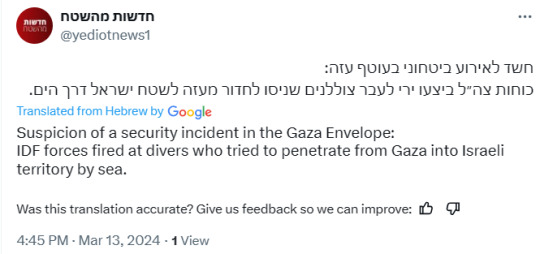
This morning also saw another independent Palestinian terrorist attack, this time on one of the major roads leading into Jerusalem. Two Israelis have been stabbed and injured, a 25 years old man, and a 19 or 20 years old woman (I heard contradicting reports, so I'm citing both options). The terrorist was 15 years old, and has been neutralized. He reached the scene of the attack riding on electric bicycles. Just a reminder, inciting and recruiting a teenager to carry out a terrorist attack is morally wrong, if not downright criminal, and it should be where everyone's ire is directed.

The IDF has confirmed that it has killed a Hamas leader in Lebanon, Mustafa Hadi. He was in charge, among other things, of promoting terrorist attacks against Israeli and Jewish targets outside of Israel.
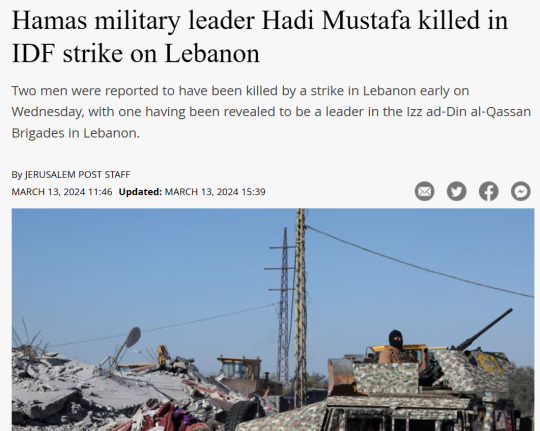
I've heard a journalist saying that there are enough aid trucks entering Gaza, the issue is that Hamas is confiscating about 60% of the humanitarian aid brought in. The info is confirmed in this article, about a new pilot the IDF is trying, to try and bypass Hamas. If the last attempt (which backfired) was to bring aid in from the south, and the IDF would secure it as it's transferred to the north (instead of handing it to local elements for the transfer), now they're going to check the trucks in the south, but bring them into Gaza directly in its northern part.

I've already expressed my POV about what is probably the worst speech given at the Oscars this year, maybe ever. Now, the Holocaust Survivors' Foundation has denounced the Holocaust-hijacking, anti-Israel speech at the Oscars as "factually incorrect and morally indefensible." The ADL sent out the same message.

I've already pointed out that the absolute majority of survivors were and are Zionist (as were many of the Jews murdered in the Holocaust), but I think it really matters that the survivors who are still around are using their own voices to speak out against this distorted narrative. Will this director and others like him, who have hijacked the Holocaust for their political messages, actually listen and apologize? I kind of doubt it. Holocaust survivors are to be listened to! ...But only if they're one of the 5 or so who hate Israel.

And while we're at it, it should also be mentioned that the red hand pin that many stars wore at awards ceremonies this year stems from a symbol featured in many anti-Israel protests, leading back to the 2000 brutal lynching and murder of two Israelis who took a wrong turn into the Palestinian city of Ramallah. I think it says a lot in itself, that Arabs in general and Palestinians in particular SAFELY walk around Jewish majority Israeli cities every day, or live in them, but Jews have to fear for their lives when they enter, even accidentally, Arab areas that have been ethnically cleansed of Jews. Regarding the red hand symbol, I'm not saying that every person using it fully understands its origin, that it became a feature of anti-Israel demonstrations only after the lynching, it was never spotted at them before that, it became a prominent feature of the Second Intifada (2000-2005), I'm also not saying this is the only use of a red hand as a protest symbol ever, so people who saw the pin would have easily been unaware of its origin in this context. But it feels like another sign of the same problem: people are ignorant about this conflict, yet they allow themselves the freedom to talk about it, or use its symbols and terms, without truly understanding them, and without seeming to care about the consequences. It's a bit like someone who might have watched Dukes of Hazard, and started wearing a pin of the Confederate flag, initially not knowing (but later also not showing any care for) why this would hurt the feelings of many African Americans.

Here's another reminder from November 2023, that informed people knowing about the origin of this symbol pre-dates the Oscars:

BTW, I should probably mention that the Italian press crew, which documented the lynching and the proudly presented bloodied hands of one murderer, shared the footage despite threats to their lives from Palestinians (while another Italian film crew threw that one under the bus, promising that their TV station abides by the rules of the Palestinian Authority, implying they comply with the PA's censorship of Palestinian-committed violence). An American news team from ABC, was attacked and prevented from documenting the lynching. A British photojournalist, Mark Seager, who tried to document the lynching as well, was attacked by Palestinians, his equipment was destroyed, and he said he would have nightmares for the rest of his life. Back in 2009, Fatah (the ruling party of the PA) used the lynching to claim they were more deadly towards Israelis than Hamas. ANYONE who lived through this, as many Israelis and Jews did, or even just heard about it growing up, would not easily forget the symbolism of the red hand in this context.

This is 13 years old Mai Zuheir abu Subeich.
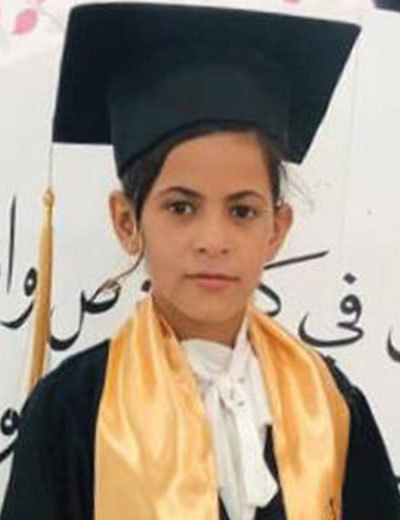
She was an Israeli Arab Muslim Bedouine. She excelled as a student, and dreamed of being an English teacher. Family members say she was even already teaching her siblings and cousins. On Oct 7, she was killed when a Palestinian rocket from Gaza hit her home, in the Negev desert. This Ramadan, as IDF soldiers continue to fight in Gaza, Jews, Christians, Muslims, Bedouins and Druze, please remember they're fighting to keep the Muslim citizens of Israel safe from Hamas, too.
(for all of my updates and ask replies regarding Israel, click here)
#israel#antisemitism#israeli#israel news#israel under attack#israel under fire#terrorism#anti terrorism#hamas#antisemitic#antisemites#jews#jew#judaism#jumblr#frumblr#jewish#israelunderattack
133 notes
·
View notes
Text
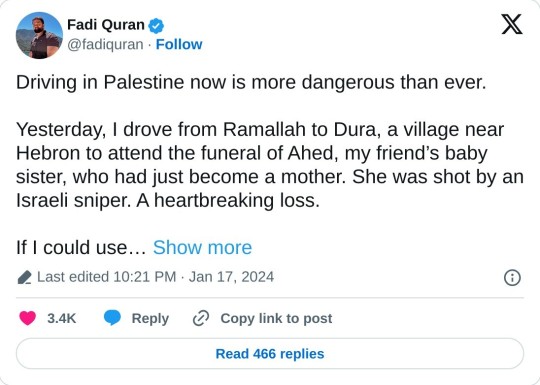
Driving in Palestine now is more dangerous than ever.
Yesterday, I drove from Ramallah to Dura, a village near Hebron to attend the funeral of Ahed, my friend’s baby sister, who had just become a mother. She was shot by an Israeli sniper. A heartbreaking loss.
If I could use Israel’s apartheid roads designated for settlers, it would be an 80-90 minute drive, but it took me 4 hours.
Why?
First, we’re forced to take segregated Palestinian only roads which make it a 2.5 hour drive because of checkpoints.
But these days, it’s even worse as Israel has imposed an even more strict strangulation policy over the West Bank, which means even some of those segregated roads are blocked and there are 10 times as many checkpoints.
Taking this drive outside our village/cities of residence is extremely dangerous for three reasons:
Settler attacks: Israeli settlers are in rampage mode, and you don’t know when you could get hit by a rock or bullet from one of their raging mobs.
Soldiers at the end of a wrong turn: There are no signs for what “roads” are currently opened or closed for us, you have to guess or stop to ask locals every few miles. If you make a wrong turn and end up face to face with soldiers, they can shoot you, and claim you attacked them.
Arrests for social media posts: If you’re stopped at a checkpoint, soldiers these days are taking folks’ phones and checking their WhatsApp’s and telegram and instagram. If you have a message standing in solidarity with Gaza, or anything the Israeli soldiers see as offensive, they’ll beat you to a pulp, and could even arrest you. My friend Diala, a human rights lawyer, was just arrested at one of these checkpoints this evening. We don’t know why, but it likely relates to her work and messages they found on her phone about it.
On my end, driving back at night was a nightmare, mainly because I had a friend in the car and was worried about him.
As we drove back, these historically busy streets were ghostly empty because nobody is taking the risk of driving at night unless necessary.
Every turn I’d take, I’d slow down to a crawl to make sure there was no trigger happy soldier or angry settler ready to pounce.
I got lucky as, although we waited at a checkpoint for an hour, the soldiers got bored and literally opened the checkpoint for all the cars to pass without any security check — proof they’re using these checkpoints arbitrarily as collective punishment.
In Dura, I saw where Ahed was shot.
The soldiers had stormed her village as part of their intimidation tactics in the West Bank to keep people anxious. Ahed ran to her roof to warn her husband to come home. An Israeli sniper shot her in the head.
As I drove home, thinking of Ahed, her heart broken family, the families of my friends in Gaza, all the souls we’ve lost, and how easy my life could be taken for simply driving across my ancestral lands to help my friend in her grief.
It shouldn’t have to be said, but our lives are precious. They’re beautiful. They’re equally worthy of joy and basic dignity.
I’m committed to one day being able to drive across my people’s ancestral land a free man, surrounded by my liberated people.
If Israel’s death machine is haunting us around every corner, we might as well live fighting for a life worth dying for.
103 notes
·
View notes
Text
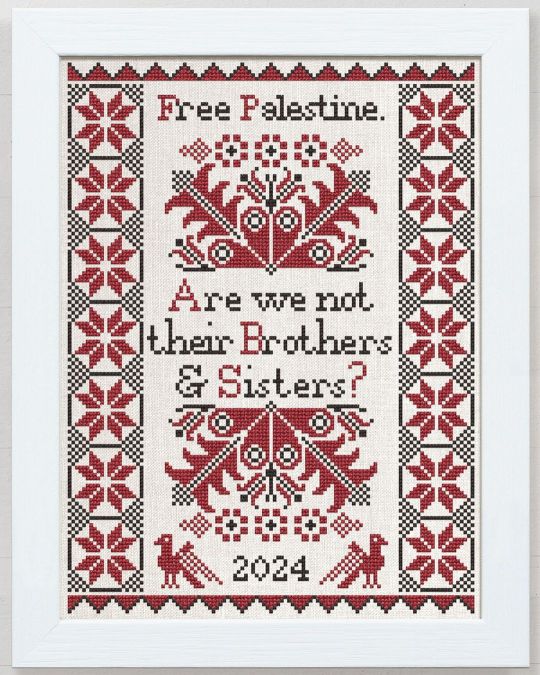

Free Palestine designed by Jacob de Graaf of Modern Folk Embroidery.
Today I want to share a pattern with you that uses Tatreez embroidery elements in support of the people of Palestine struggling through one of the most difficult times in their lives. I am aware that this is a highly divisive and contentious issue for a lot of people. Some people might be shocked or hurt by me sharing this design. I do hope on the other hand that by speaking out, others will do the same and will not be afraid of any backlash that might be there. Sadly, the world has become more and more polarised – you are either this or that, and if you’re pro-this, you must be anti-that. The world is a more complex place and though I might be pro-this, it does not mean that I am anti-something-else. I hope you can see that side of me. We should not be scared to stand up for what is right, and to speak about such things without the fear of polarisation getting the better of us. For now, the text below as it appears in the booklet plus download links for the pattern.. Rotterdam, May 8th 2024 Lately, my great-uncle Jacob de Graaf and his wife Trijntje de Kroon have been on my mind. Three years ago, they were posthumously awarded the Yad Vashem award for bravery displayed during the Second World War by hiding Jewish citizens in their homes and saving them from certain death at the hands of the Nazis. I never got to know them as they passed just before and after my birth, but I admire their bravery in doing what they felt was right at a time when it was not only difficult but potentially life-threatening. They stood up for people they could help. I thought of it again yesterday when I saw a young man (@samih.madhoun on Instagram) playing a borrowed oud and singing songs in the refugee camp in Rafah, lifting the spirits of fellow refugees through his art. As I tearfully watched the video, I got angry at myself for not doing more besides weeping at my phone. For months, I have been shocked into a state of numbness by the genocide playing out on my TV, computer and phone. The annihilation of Palestine by the Israeli army is being broadcast to us live, and for too long, I have been struggling with how to express my fear, my anger, my frustration, and my support for the Palestinian people.We cannot turn a blind eye to what is currently happening. Our political leaders need to take action and speak out against the current genocide. I do not have the bravery of my great-aunt and uncle, but I can design patterns and share them with others—and hopefully inspire folks to speak out, too. My great-uncle did what was right during WWII. Will we do the same for our brothers and sisters in Palestine? ABOUT THE DESIGN This design uses Tatreez motifs found on traditional Palestinian dress. The central motif, called Scissors and Roses (Muqass wa Ward ), comes from Gaza. As the land is torn apart, I split the design into two, placing the question “Are we not their brothers and sisters” between them. On the sides is a rose border found on a dress from Ramallah. The doves at the bottom are found on many Palestinian embroideries. TECHNICAL DETAILS This design uses two colours: Black (2224 crosses) and Red (4226 crosses). It measures 113 crosses in width and 153 crosses in height. It features only full crosses and no specialty stitches. From the second page of the pattern onwards, you will notice a greyed-out area of 3 crosses wide — this indicates an overlap with the previous page to make it easier for you to continue stitching. The graph below gives size- and floss estimates for a wide range of materials. Floss calculations are based on working with 2 strands on 28- to 36-count linen (14- to 16-count aida). Higher counts use a single strand. You are free to stitch with as many strands as you like. The first floss estimate is for black, the 2nd for red. For instance, on 32-count linen, you would require 1.1 skein of black floss (standard 8 metre length skeins such as DMC and Anchor), and 2.1 skein of red floss.

I charted this in black and red, but feel free to choose your own colours. If you stitch on white, you could add some green to the design for instance to reflect the colours of the Palestinian flag. Thank you so much for downloading this free pattern and showing your support for Palestine. If you can, please make a donation to organisations who are actually doing amazing work in physically helping the Palestinian people. Two organisations that I have donated to are unwra.org and pcrf.net – but there are many bigger and smaller initiatives worthy of your support. Click on one of the links below to download your pattern. Feel free to share, print, and redistribute this design. When you do, I would ask not to change the booklet itself. Free Palestine – A4 format Free Palestine – Letter format With love, Jacob de Graaf
30 notes
·
View notes
Text
Free Palestine!
I was six…six years old when I was taught about Quds, shown the beautiful golden dome of Qubbat al-Sakhra, when I was taught about the beautiful olive farms, the welcoming people,about the richest and deepest history a land could have, the prophets that had walked this land, the people who stood against crusades and kept alive religion and peace in Masjid-al-Aqsa, the deep love and courage that is carved into the souls of palestinians for their land, when I learned to love Palestine like it was where my heart always belonged.
I was eight when we painted flags and watched our parents shed tears over the loss of lives of our palestinian brothers and sisters. When they marched in solidarity and gathered communities together to donate to help our brothers and sisters in Gaza, Ramallah, Jenin, the West Bank, Nablus, Haifa…I was eight when I saw the blood of martyred Palestinians on a bloodied hospital floor and the media calling their resistance terrorism.
I was ten and I sang From the River to the Sea, for my brothers and sisters in palestine.
I was twelve and I made bracelets with my friends to sell and raise money to send to our brothers and sisters in Gaza. and I was twelve when they called people who looked like me and my family, terrorists.
I was fourteen, and then sixteen and eighteen and twenty, and I still said FREE PALESTINE! When I cried when I saw photos of the elderly being abused at Al-Aqsa when they just wanted to speak to their creator in the house his holy prophets constructed in his remembrance.
I was twenty two when I witnessed Israeli brutality in Gaza, in Ramallah, in Jersusalem. Persecuting the people of Palestine for simply being. Walls constructed to keep them in, bombs dropped on homes, children orphaned and still I cried Free Palestine but Palestine had a smile on its face. It’s people loved and lived and said:
“حَسْبُنَا اللَّهُ وَنِعْمَ الْوَكِيلُ”,
“Sufficient for us is Allah, and [He is] the best Disposer of affairs.”
Then I was twenty four, and twenty six and we still cried Free Gaza, help the children of Palestine, free Palestine.
And now I am almost thirty, and I am watching and my heart is crying, broken, my eyes have not been able to look at the world the same, I feel as if I am watching my own brothers and sisters die again and again. We are watching Palestinians die by the thousands, every video brings me to tears and i feel as if I cannot breathe, the sadness that has taken over me is a shadow when I compare it to the horrors the Palestinians are living at this very moment. We beg the world to see us as more than human animals, we beg the world to help Gaza and the children of Palestine. We have to convince you all we are humans, who deserve a chance to live, that this is immoral, we have to justify WHY we want the right to live? We are watching a genocide, children dead by the thousands and hospitals unable to cope with the death tolls and no one who wants to stand up to this oppressor but the Palestinians … The Palestinians' bravery and courage and absolute devotion to their faith is simply stunning. They repeat again and again “God is sufficient for us” and I feel as if I am the loser…they have such a love and fervor for their land and their faith that even in the face of death it isn't something worth giving up.
And their love of Palestine has brought such unity around the world, that we all feel as if Palestine has been in our very souls from the beginning of time. We are in the streets by the hundreds of thousands now, screaming FREE PALESTINE, and I am so filled with pride for their resilience that has driven us all. And Palestine will be free from the river to the sea, they will rise up again and every Palestinian child who left their heart in the beautiful lands of Al-Quds will get the chance to return and walk the land the prophets walked and sing in the fields their ancestors were forced to give up and they will be free.
As I grew older I began to realize, the saying Palestinians shouted with such fervor “By soul, by blood, we'll defend you oh al-Aqsa!” is the embodiment of Palestinian resistance and love for their homeland. And now I know love, dignity and courage were born in Palestine, a land that was created for peace but never saw a peaceful day.
Free Palestine…
57 notes
·
View notes
Text
(JTA) — When I was 18 years old, like many American Jews, I spent a gap year in Israel. At a right-wing army-prep program called Mechinat Yeud, located in the illegal settlement of Efrat, I learned Torah, went on hikes and practiced krav maga. I fondly look back at this year as a positive experience and a time when I matured as a young adult.
I also saw the daily mechanisms of the occupation, though I didn’t have the vocabulary to articulate this.
Over that year, I saw Palestinians whose cars bore different license plates than those driven by Jews. I saw a checkpoint between Israel and the West Bank that was a formality to Jews like my friends and me but very real to the Palestinians living right next to us. Though I finished my year in Yeud with a strong desire to live in Israel, I also knew that I couldn’t be complicit in Palestinian oppression.
I eventually moved to Israel and threw myself into anti-occupation activism, spending weeks and months at a time in Palestinian communities in the West Bank. In addition to the bureaucratic oppression that Palestinians face on a daily basis, I saw — and sometimes was a victim of — the settler violence that plagues the West Bank.
During the American civil rights movement, Rabbi Abraham Joshua Heschel famously referred to his protesting as “praying with his feet.” This past Yom Kippur, when the rabbis of the Talmud tell us to fully prostrate ourselves during prayer, I asked for forgiveness with my whole body by spending the Day of Atonement in Ein Rashash, a Palestinian Bedouin shepherding community located 22 miles northeast of Ramallah. Its residents had requested a 24/7 presence from solidarity activists due to threats from the nearby Israeli outpost of Malachi Hashalom.
According to a United Nations report released on Sept. 21, 1,105 Palestinians fled their homes and villages in 2022 and 2023. The report stated that settler violence is at a record high since the U.N. began documenting the trend in 2006.
This report includes the villages of Ein-Samia, Al-Qabun, al-Baqa and Ras al-Tin. All of these villages were located near Ein Rashash, and like Ein Rashash, the communities all relied on shepherding for their livelihood. Settler attacks in the Palestinian towns of Huwara and Turmus Aya, frequently described as pogroms, have received attention within Israel and internationally.
Ein Rashash has faced similar settler violence and harassment. Shortly upon entering the village, one can see where settlers shattered the windows of homes and destroyed an outhouse in an attack in June. The community is considering leaving their land just like the community of Ein-Samia and many others have done.
In response to this violence, a group of activists, most notably Rabbi Arik Ascherman, is spending long periods of time in Ein Rashash — located north of the ruins of Ein-Samia — to use our privilege as a de-escalating presence. When non-Palestinian activists are around, settler violence is less likely. Ein Rashash and the nearby villages are all located in Area C, the portion of the West Bank under full Israeli control as per the Oslo Accords. The Palestinian residents do not have Israeli citizenship, and they are subject to military law as opposed to the civil courts through which Israeli settlers are tried. “Protective Presence” activism is utilized in other communities in Area C that face regular threats of settler violence and home evictions, such as Masafer Yatta. I have done several shifts already, and I volunteered for the Yom Kippur shift.
I was accompanied by five other activists. The first thing we did was assign roles in case settlers came. Who would call the police or other activists? Who would film? Who would stand in front of a settler’s car if he tried to enter the village or drive through a flock of sheep? These are normal conversations in this line of work.
There is no break during Protective Presence activism. Either there’s an immediate incident, or you’re waiting for the next one. Every unfamiliar car or person in the distance can be a settler coming to attack or harass or bringing soldiers to force Palestinians off their land. A drone from the nearby outpost hovered overhead for around 30 seconds, and I was on edge for the next hour. You sleep with one eye open. Jewish holidays often bring with them right-wing violence in Israel and the West Bank. Hate crimes were carried out in Bat Yam this year and last year, and in 2021 there was a settler pogrom in the Palestinian village of Mufagara.
This is exhausting and emotionally draining. Unlike many other Protective Presence shifts I have participated in, Yom Kippur ended without incident.
After 25 hours, I had the privilege of going home to Jerusalem. Palestinians do not have this option. This is their life.
According to Torah, on Yom Kippur the Israelites are told to “afflict themselves.” The rabbis concluded that self-affliction must refer to fasting, reasoning that “affliction” refers to something that, when taken to a certain extent, can lead to death.
Life under occupation can, and does, lead to death. One look at the statistics makes that all too clear. Since 2000, 10,667 Palestinians in the occupied territories have been killed by Israeli soldiers or civilians.
Protective Presence is my self-affliction. And yet, in homage to Yom Kippur’s imagery of being sealed in the Book of Life, life goes on. Activists laughed with and got to know each other and our Palestinian hosts. We read and we ate delicious homemade food. We didn’t embrace misery as a form of repentance. We embraced the full spectrum of life.
I believe fasting is mentally, physically and spiritually unhealthy. The only self-affliction I find meaningful is in sharing the pain — and the joy — of my fellow human beings, particularly in a way that lightens their pain and suffering. The people of Ein Rashash have told us that our presence is making their lives easier and helping them stay on their land. The children are laughing and playing in a way that they were not when we first started these shifts. This has been the most meaningful Yom Kippur I’ve ever had.
In Mishnah Yoma 8:9, we learn that repentance on Yom Kippur only allows us to atone for the sins between ourselves and God. For a sin against another person, one must “satisfy their fellow.” We don’t need to ask God for forgiveness. We must stand with the Palestinians suffering under Israeli rule, until they’re satisfied.
I know that it’s not a matter of if the settlers will be back, but when. For as long as that’s the case, I will continue to pray with my body and sometimes “self-afflict” in the name of justice and equality. The Talmud states self-affliction does not absolve one from their sins towards other people, only those towards God. And yet, our sins towards other people are the ones for which we direly need to repent.
86 notes
·
View notes
Text
I’m American.
I was born in this country years ago in a hospital, in a city, in California. I’m American.
I grew up watching PBS Kids and listening to music on my iPod with a Fruit Roll-Up in my hand, waiting for my older sister to come back home from soccer practice so I could ask her to play with me. I’m American.
When I was in middle school, my teachers taught me about 9/11. I came back home and told my dad about it, and he said that when he saw it on the news, he almost signed up to rejoin the military. For weeks after that, I wondered how anyone could ever kill so many innocent people.
A couple months after that, I learned about my great grandmother.
My great grandmother was not American. She was born in Ramallah, Palestine. The West Bank. She was kicked out of her home by soldiers, and had to flee her country to live in El Salvador. To make sure they would let her in, she changed her last name to Cortez. When I asked why she had to do that, my mother told me that countries don’t like Arabs.
My nonna is American. She is my great grandmother’s daughter, and she moved to the U.S. and got her citizenship a long time ago. She kept her last name as Cortez until she got married, because 9/11 happened and because countries don’t like Arabs.
My mother is American. She was born here like me, and she grew up in California for most of her life. When she was in school, the kids would make fun of her and my aunt by screaming “Watch out! The terrorists are here! I see a bomb strapped to their chests!”
I’m American. One time in school a teacher told the class to share our family histories. I told everyone about how my family was Palestinian. They didn’t know what Palestine was. I told them I was Arab. One student told me I looked too white, another asked me if I was a terrorist.
I’m American. In my freshman year, I found out that we still had family in Palestine. They’re dead now.
I’m American. One time I met a woman who came from Ramallah. I told her my great grandmother’s story. She told me that she hoped I could go home soon. She said it was beautiful, and that everyone is family there. I almost cried that day, and after that I would dream of what it would be like to visit my family’s home.
I’m American. In high school, I made a presentation about Palestine. I told everyone about the olive trees and the community, about our culture’s history with weaving and about the occupation. None of them had known we were dying until I told them.
I’m American. I watch as our news anchors spread lies about my people while they nod along to IOF representatives calling my family animals.
I’m American. I see photos of my people lying dead in the dirt, their faces white with ash from the bombs that killed them.
I’m American. I repost videos of little kids, younger than me, begging for food while they cradle babies even younger than them. I want to make people listen to them.
I’m American. Every time I see people drinking Starbucks or eating McDonalds I feel sick to my stomach and think about the family I used to have, whose bones lie under rubble.
I’m American. I want to cry when I think about the weapons our taxes fund, the families our money has killed. Families like mine.
I’m American. I want to scream at my representatives and my president, who see my people as nothing but statistics and the cries of their citizens as nothing but the buzzing of flies.
When I was a child, I wondered why 9/11 happened. I wondered how anyone could ever do something so evil.
It’s 2024 and I’m watching my people die.
How could anyone be so evil?
#in case any friends read this and get worried#don’t worry i’m alright i just had to get this out of my system#i’m not giving up on my people or our ability to save them any time soon#free palestine#free gaza#palestine#all eyes on rafah#from the river to the sea palestine will be free
35 notes
·
View notes
Text

I saw Ramallah - Mourid Barghouti
5 notes
·
View notes
Text
The 96th Annual Oscars
Its come to my attention that the Oscars are on tonight and to that I say...
FUCK THE OSCARS. I don't care how many years it's been on. I don't care who's hosting it, who is on the red carpet, what they’re wearing, who wins, who loses. I don't care about any of that. What I do care about is what's going to happen during the Oscars; in Gaza and in Rafah and Ramallah.
Today, well tonight actually is the start of a Muslim Holiday known as Ramadan.It’s a holiday that lasts a month long so about 29-30 days where those who are able to participate,fast from sunrise to sunset. They do this every single day of Ramadan. They eat a meal before sunrise then break the fast after the sunsets. On every single website that I saw while researching this month it's regarded as a holy month. A month focused on self-reflection and spiritual improvement. It's a time for community and these people are starving to death. They are dying from malnutrition and disease because of Isn't Real. The lack of supplies, proper food, access to proper medical care for the sick. Also because the fucking US vetoes a humanitarian ceasefire.
This is insane and now people who live in the US are gonna be tuned into what's happening on the red carpet. After what happened during the Grammys I have no doubt that my feed is gonna see a lot of talk about the Oscars and I hate that. I hate it!!!People are dying!! People need help!! Those attempting to leave to get to Egypt have to pay like $5000 thats fucking crazy!! It's crazy, it's insane, its sick and twisted, and so very disgusting. I want to scream! I truly want Palestine to be free! I want Palestinians to no longer worry about when the next bomb will drop or how long till they get their next meal. I hope they never have to pull another body out of the rubble.
Death to the colonizers and shame on those who are silent in the face of genocide. I hope for the liberation of Palestine in this lifetime and wish much success to those who continue to take Isn't Real to court as well as the countries who are taking action to support the liberation of Palestine.
-starfish
#free gaza#free palestine#from the river to the sea palestine will be free#genocide is bad#the oscars#oscars 2024#academy awards#gaza#gaza strip#gaza genocide#gazaunderattack#palestine genocide
7 notes
·
View notes
Text

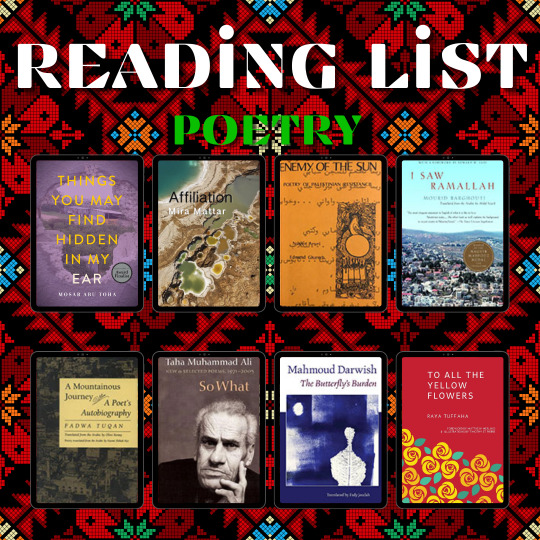
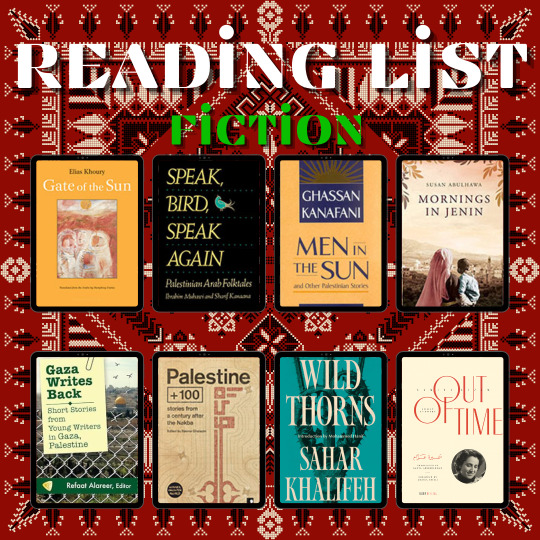
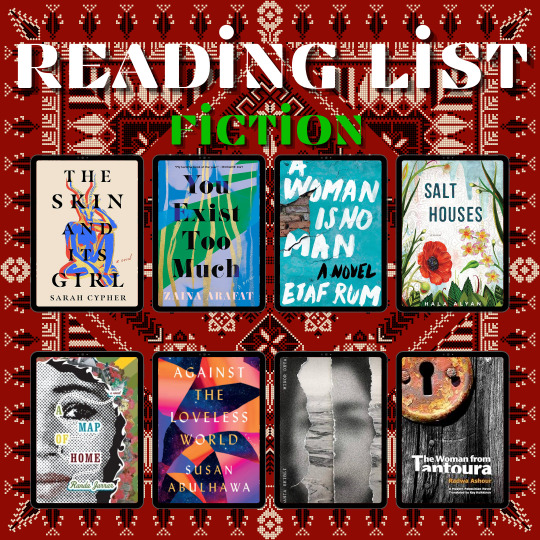
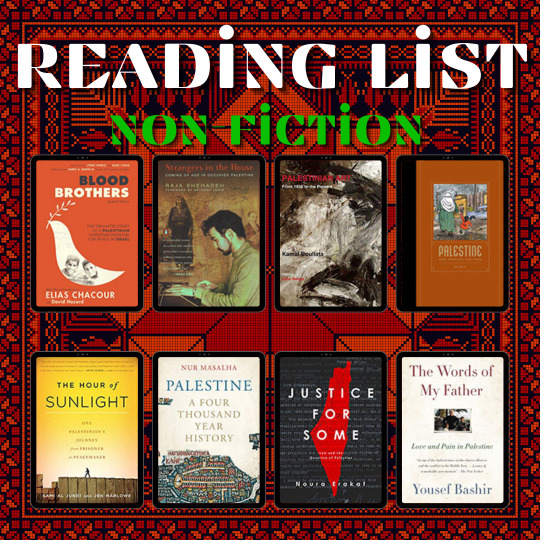

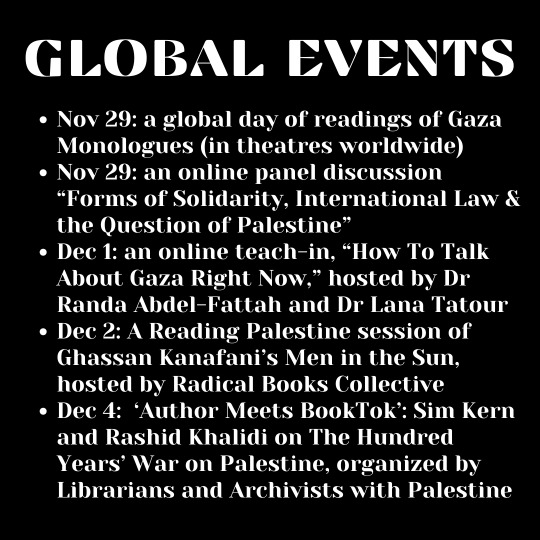
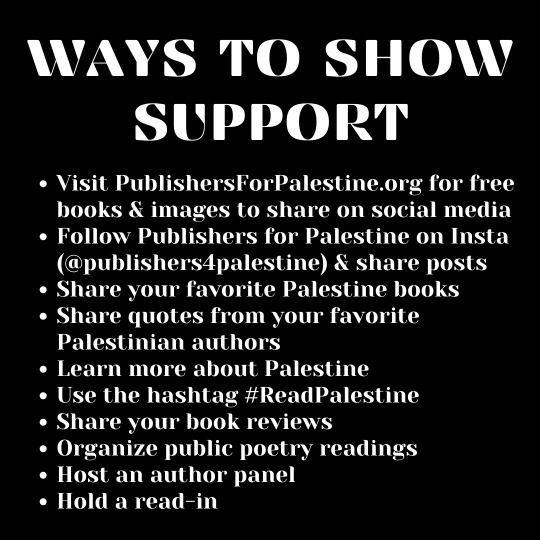
Read Palestine Week
🇵🇸 Good morning, my beautiful bookish bats. Can I start by saying a huge THANK YOU for sharing my Queer Palestinian Book post? Seriously, thank you so much. Let's keep that momentum by observing Read Palestine Week (Nov 29 - Dec 5). I've compiled a list of books to help you, along with a list of upcoming events and resources you can use this week and beyond.
🇵🇸 A collective of over 350 global publishers and individuals issued a public statement expressing solidarity with the Palestinian people. Publishers for Palestine have organized an international #ReadPalestine week, starting today (International Day of Solidarity with the Palestinian People).
🇵🇸 These publishers have made many resources and e-books available for free (with more to come). A few include award-winning fiction and poetry by Palestinian and Palestinian diaspora authors. You'll also find non-fiction books about Palestinian history, politics, arts, culture, and “books about organizing, resistance, and solidarity for a Free Palestine.” You can visit publishersforpalestine.org to download some of the books they have available.
POETRY 🌙 Things You May Find Hidden in My Ear by Mosab Abu Toha 🌙 Affiliation by Mira Mattar 🌙 Enemy of the Sun by Samih al-Qasim 🌙 I Saw Ramallah by Mourid Barghouti 🌙 A Mountainous Journey by Fadwa Tuqan 🌙 So What by Taha Muhammad Ali 🌙 The Butterfly’s Burden by Mahmoud Darwish 🌙 To All the Yellow Flowers by Raya Tuffaha
FICTION 🌙 Gate of the Sun by Elias Khoury 🌙 Speak, Bird, Speak Again: Palestinian Arab Folktales 🌙 Men in the Sun by Ghassan Kanafani 🌙 Morning in Jenin by Susan Abulhawa 🌙 Gaze Writes Back by Young Writers in Gaze 🌙 Palestine +100:Stories from a Century after the Nakba 🌙 Wild Thorns by Sahar Khalifeh 🌙 Out of Time by Samira Azzam
🌙 The Skin and Its Girl by Sarah Cypher 🌙 You Exist Too Much by Zaina Arafat 🌙 A Woman is No Man by Etaf Rum 🌙 Salt Houses by Hala Alyan 🌙 A Map of Home by Randa Jarrar 🌙 Against the Loveless World by Susan Abulhawa 🌙 Minor Detail by Adania Shibli 🌙 The Woman From Tantoura by Radwa Ashour
NON-FICTION 🌙 Blood Brothers by Elias Chacour 🌙 Strangers in the House: Coming of Age in Occupied Palestine by Raja Shehadeh 🌙 Palestinian Art, 1850–2005 by Kamal Boullata 🌙 Palestine by Joe Sacco 🌙 The Hour of Sunlight: One Palestinian’s Journey from Prisoner to Peacemaker by Sami Al Jundi & Jen Marlowe 🌙 Palestine: A Four Thousand Year History by Nur Masalha 🌙 Justice for Some: Law and the Question of Palestine by Noura Erakat 🌙 The Words of My Father: Love and Pain in Palestine by Yousef Khalil Bashir
🌙 Traditional Palestinian Costume: Origins and Evolution by Hanan Karaman Munayyer 🌙 Mountain against the Sea: Essays on Palestinian Society and Culture by Salim Tamari 🌙 This Is Not a Border: Reportage and Reflection from the Palestine Festival of Literature 🌙 We Could Have Been Friends, My Father and I: A Palestinian Memoir, by Raja Shehadeh 🌙 Les échos de la mémoire. Une enfance palestinienne à Jérusalem, by Issa J. Boullata 🌙 A Party For Thaera: Palestinian Women Write Life In Prison 🌙 Light in Gaza: Writings Born of Fire, 🌙 Voices of the Nakba: A Living History of Palestine
#free palestine#save palestine#books#book list#book recs#book recommendation#booklr#book blog#batty about books#battyaboutbooks#arab american heritage month#arab american writers#palestinian writers#palestinian poetry#poetry#poetry books#nonfiction#fiction books#queer fiction#queer community#queer books#muslim writers#read palestine week
240 notes
·
View notes
Text
THE BOOKS I READ IN 2023
*I read it before
**I read it more than once this year
Aaron Caycedo-Kimura, Common Grace
Adania Shibli, Minor Detail, translated from the Arabic by Elisabeth Jaquette
Ahmad Almallah, Bitter English
Alison Lubar, It Skips a Generation
Atef Abu Saif, The Drone Eats With Me: A Gaza Diary
Brynn Saito, Under a Future Sky
Camonghne Felix, Dyscalculia: A Love Story of Epic Miscalculation
*Carolina Ebeid, You Ask Me to Talk About the Interior
Chanté L. Reid, Thot
*Christina Sharpe, Ordinary Notes
Christine Shan Shan Hou & Vi Khi Nao, Evolution of the Bullet
Christopher Okigbo, Labyrinths (with Paths of Thunder)
Cristina Rivera Garza, Liliana’s Invincible Summer
Dionne Brand, Chronicles of the Hostile Sun
*Dionne Brand, No Language is Neutral
Dionne Brand, Primitive Offensive
Édouard Louis, Who Killed My Father, translated from the French by Lorin Stein
**Emily Lee Luan, 回 / Return
Erin Marie Lynch, Removal Acts
Fady Joudah, Footnotes in the Order of Disappearance
Farid Tali, Prosopopoeia, translated from the French by Aditi Machado
Gabriel Palacios, A Ten Peso Burial For Which Truth Is Sign (coming out 2024)
Ghayath Almadhoun, Adrenalin, translated from the Arabic by Catherine Cobham
Hauntie, To Whitey & The Cracker Jack
Hervé Guibert, To the friend who did not save my life, translated from the French by Linda Coverdale
Hiromi Ito, Tree Spirits Grass Spirits, translated from the Japanese by Jon L. Pitt
*James Baldwin, No Name in the Street
*James Baldwin, Nobody Knows My Name
*James Baldwin, The Devil Finds Work
James Fujinami Moore, Indecent Hours
Jami Nakamura Lin, The Night Parade
Jawdat Fakhreddine, Lighthouse for the Drowning, translated from the Arabic by Huda Fakhreddine and Jayson Iwen
Jed Munson, Commentary on the Birds
Jennifer Hayashida, A Machine Wrote This Song
Jenny Odell, Inhabiting The Negative Space
Jenny Xie, The Rupture Tense
*Joy Kogawa, A Choice of Dreams
Joy Kogawa, A Garden of Anchors: Selected Poems
**Joy Kogawa, From the Lost and Found Department: New and Selected Poems
Joy Kogawa, Gently to Nagasaki
*Joy Kogawa, Jericho Road
*Joy Kogawa, Obasan
Joy Kogawa, The Rain Ascends
Joy Kogawa, The Splintered Moon
*Joy Kogawa, Woman in the Woods
Juan Felipe Herrera, Akrílica, eds. Farid Matuk, Carmen Giménez, Anthony Cody
Kamo-no-Chomei, Hojoki: Visions of a Torn World, translated from the Japanese by Yasuhiko Moriguchi and David Jenkins
Keorapetse Kgositsile, Collected Poems, 1969-2018
*Kiku Hughes, Displacement
Kōno Taeko, Toddler-Hunting, translated from the Japanese by Lucy North
Leila Khaled, My People Shall Live: Autobiography of a Revolutionary, as told to George Hajjar
Lena Khalaf Tuffaha, Kaan and Her Sisters
**Lindsey Webb, Plat (coming out in 2024)
Lisa Hsiao Chen, Activities of Daily Living
Liyana Badr, A Balcony over the Fakihani, translated from the Arabic by Peter Clark with Christopher Tingley
Lucille Clifton, An Ordinary Woman
*Lucille Clifton, Blessing the Boats
Lucille Clifton, Good News About the Earth
Lucille Clifton, Good Times
Lucille Clifton, Two-Headed Woman
Mahmoud Darwish, The Butterfly’s Burden, translated from the Arabic by Fady Joudah
Mahmoud Darwish, If I Were Another, translated from the Arabic by Fady Joudah
Mahmoud Darwish, Palestine as Metaphor, translated from the Arabic by Amira El-Zein and Carolyn Forché
Maya Abu Al-Hayyat, You Can Be The Last Leaf, translated from the Arabic by Fady Joudah
Maya Marshall, All the Blood Involved in Love
Michael Prior, Model Disciple
*Mitsuye Yamada, Camp Notes and Other Poems
Mitsuye Yamada, Full Circle: New and Selected Poems
Mohammed El-Kurd, RIFQA
**Mosab Abu Toha, Things You May Find Hidden in My Ear
Mourid Barghouti, I Saw Ramallah, translated from the Arabic by Ahdaf Soueif
Mourid Barghouti, I Was Born There, I Was Born Here, translated from the Arabic by Humphrey Davies
Mourid Barghouti, Midnight, translated from the Arabic by Radwa Ashour
Na Mira, The Book of Na
Najwan Darwish, Nothing More to Lose, translated from the Arabic by Kareem James Abu-Zeid
Natsume Sōseki, Kokoro, translated from the Japanese by Edwin McClellan
Nona Fernández, Voyager: Constellations of Memory, translated from the Spanish by Natasha Wimmer
Noor Hindi, DEAR GOD. DEAR BONES. DEAR YELLOW.
Osamu Dazai, No Longer Human, translated from the Japanese by Donald Keene
Osamu Dazai, The Flowers of Buffoonery, translated from the Japanese by Sam Bett
The Palestinian Wedding: A Bilingual Anthology of Contemporary Palestinian Resistance Poetry, edited and translated from the Arabic by A.M. Elmessiri
R.F. Kuang, Yellowface
Ryunosuke Akutagawa, Kappa, translated from Japanese by Lisa Hofmann-Kuroda and Allison Markin Powell
Salim Barakat, Come, Take a Gentle Stab: Selected Poems, translated from the Arabic by Huda J. Fakhreddine and Jayson Iwen
Samih Al-Qasim, All Faces But Mine, translated from the Arabic by Abdulwahid Lu’lu’a
Samih al-Qasim, Sadder Than Water: New & Selected Poems, translated from the Arabic by Nazih Kassis
*Saretta Morgan, Alt-Nature (coming out in 2024)
Satsuki Ina, The Poet and the Silk Girl (coming out in 2024)
Sawako Ariyoshi, The Twilight Years, translated from the Japanese by Mildred Tahara
Shailja Patel, Migritude
Sham-e-Ali Nayeem, City of Pearls
Sharon Yamato, Moving Walls
Shivanee Ramlochan, Everyone Knows I Am a Haunting
**shō yamagushiku, shima (coming out in 2014)
Shuri Kido, Names and Rivers, translated from the Japanese by Tomoyuki Endo and Forrest Gander
*Solmaz Sharif, Customs
Stella Corso, Green Knife
*Taha Muhammad Ali, Never Mind: Twenty Poems and a Story, translated from the Arabic by Peter Cole, Yahya Hijazi, Gabriel Levin
Terry Watada, The Game of 100 Ghosts (Hyaku Monogatari Kwaidan-kai)
Victoria Chang, Obit
*Wong May, Superstitions
THE BOOKS I'M CURRENTLY READING, THAT I HAVEN'T FINISHED YET
Chi Rainer Bornfree and Ragini Tharoor Srinivasan, The Portal (not yet published)
Elaine Castillo, How to Read Now
Eqbal Ahmad, The Selected Writings
Essays, ed. Dorothea Lasky
Fadwa Tuqan, A Mountainous Journey: A Poet's Autobiography, translated from the Arabic by Olive Kenny
James Welch, Winter in the Blood
Lan P. Duong, Nothing Follows
Mattilda Bernstein Sycamore, Touching the Art
Preti Taneja, Aftermath
Wanda Coleman, Wicked Enchantment
10 notes
·
View notes